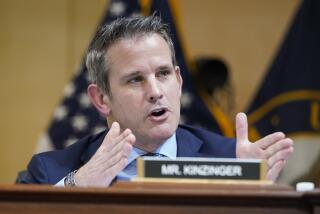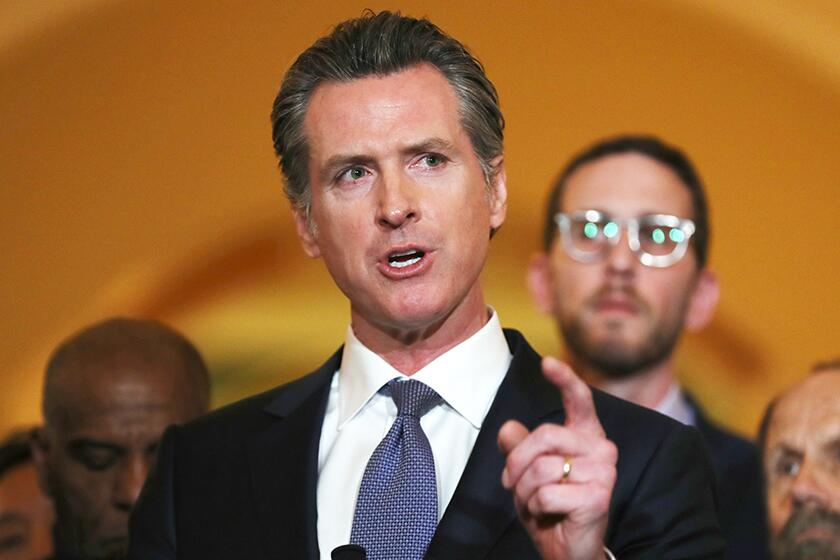GOP Facing a ‘Nightmare’ After Duke Makes Runoff : Politics: Republicans can back ex-klansman or a partisan Democrat. Party’s status in the South is at stake.
- Share via
NEW ORLEANS — Former Ku Klux Klan leader David Duke’s success in the Louisiana gubernatorial primary spells trouble for both parties--but mostly for the GOP and President Bush.
Democrats here in Louisiana now are worrying about getting white support in the Nov. 16 runoff for their candidate, former Gov. Edwin W. Edwards, who carried the black vote Saturday and led the 12-candidate field overall with 34% of the vote. Duke finished second with 32%, demonstrating the considerable appeal that his message has to the state’s white voters with its overtones of voter discontent and its undertones of racism.
But for the Republicans, the problems seem broader and deeper, potentially extending beyond the borders of Louisiana to the other Southern states that have been a citadel of GOP support in presidential elections for more than two decades.
The GOP dilemma is whether to accept Duke into the party fold, and along with him the stigma of his extremist past as a klan wizard and Nazi sympathizer, or repudiate him and risk antagonizing his supporters who have been an important component in their Southern coalition.
“It’s a nightmare for us,” William A. Nungesser, GOP state chairman, said in a telephone interview Sunday.
In the runoff, GOP leaders must choose between backing Duke, who bills himself as a conservative Republican, or Edwards, a highly partisan Democrat long regarded as excessively liberal by Republicans. Or they could sit out the campaign in a state that they had been counting on as a bridgehead for party realignment in Dixie.
For this predicament, Nungesser blames short-sighted White House and national party strategists who persuaded incumbent Gov. Buddy Roemer to switch from the Democratic Party to the GOP earlier this year in hopes of blocking Duke’s ambitions.
The state Republican Party showed its resentment of this gambit by endorsing U.S. Rep. Clyde C. Holloway, who got just enough votes in Saturday’s primary--5%--to keep Roemer out of the runoff. Roemer received 27% of the vote.
The results represented a slap in the face for Bush, who not only helped persuade Roemer to turn Republican but came here to campaign for him and dispatched Vice President Dan Quayle on the same mission.
Bush had a one-word reaction to the outcome Sunday: “Surprise.”
Appearing on ABC’s “This Week With David Brinkley,” White House Chief of Staff John H. Sununu said: “David Duke is not the Republican nominee. He is an individual that has chosen to call himself a Republican. The President is absolutely opposed to the kind of racist statements that have come out of David Duke now and in the past.”
Nungesser claims Washington never really understood the Louisiana political realities.
“You think your worst problem would be losing the governorship to a Democrat,” Nungesser said he warned national GOP Chairman Clayton K. Yeutter two weeks ago. “But your real problem is dealing with a candidate (Duke) who is perceived as a racist and who carries the Republican label.”
While Republicans seek a solution to that headache, Duke is stepping up the pressure. At a press conference Sunday, Duke predicted that Bush and the national GOP would not get involved on his opponent’s side “as they did last year” in the U.S. Senate race. Duke got 44% of the vote then against incumbent Democrat J. Bennett Johnston.
“They would be betraying every Republican in this state, every Republican in America if they backed a liberal Democrat who has been so strongly opposed to the Republican Party for so many years,” said the 41-year-old Duke, who as a result of plastic surgery now somewhat resembles actor Robert Redford.
Duke bases his campaign around demands for curbing welfare cheating and special treatment of minorities by government. “I stand for the values of less government and less taxes, reform of the welfare system and equal rights, all the way up and down the line,” Duke said Saturday night. “And I expect the Republican Party in this state to get behind me and I think that it will.”
In a television interview, Duke said: “Government is out of control, taxes and spending. . . . We’ve also got to get back to the Christian values of our state and nation. . . . And that’s something I’ve always worked for in the Legislature, Christian family values, and that’s something I’m going to work for as governor.”
Though it is Duke’s extremist past that makes him a political liability for Bush, what makes him a challenging figure to both parties is that his appeal is not just limited to racial concerns.
“Race is mixed up with disgust with government,” said Susan Howell, director of the University of New Orleans survey research center. “They co-mingle and they are both propelling Duke’s campaign.”
Defeated Republican incumbent Roemer views the flood of resentment that swept him out of office as part of a rising national tide of discontent with government.
“There’s a lot of anger and anxiety in America and it must be dealt with,” said Roemer, 48, after conceding defeat. “And politicians have to do a better job of doing that.”
Democrats are hoping that Edwards, who is 64, with three terms as governor under his belt, is up to the task. “The majority of his (Duke’s) vote was not a racial vote but a vote of frustration at economic conditions,” said James J. Brady, Democratic party chairman in this state, where the economy has been in a prolonged slump.
Brady estimated that Edwards built his first-place finish in Saturday’s primary by combining around 90% of the black vote with less than 20% of the white vote, but contends that he can improve on the latter figure in the runoff.
“We think we have a reasonable alternative in Edwards,” said Brady. Edwards is “a pragmatic fiscal conservative who has shown he can solve the economic problems of this state,” he said.
Unfortunately for the Republicans, they have no alternative they can offer on the runoff ballot. Not only that, but as some analysts see it, the GOP would have difficulty confronting Duke if, as many here believe, he tries to challenge Bush in the 1992 presidential primaries.
University of New Orleans historian Joseph Logsdon traces the current Republican problem back to the 1970s when the party in the South won most of the support that had gone to then-Alabama Gov. George C. Wallace, whose message, like Duke’s, combined racial hostility with populist resentment of big government.
“They were able to absorb the Wallace vote and hold it without having to do much as long as they were running to the right of the Democrats,” Logsdon said. “But now they have somebody running to their right, and they don’t know how to compete.”
As Duke’s strategists see it, instead of trying to lick Duke, Bush should join up with him for his own political advantage. “Take a look around,” Duke campaign manager Howie Farrell said, indicating the enthusiastic crowd that packed a campaign rally on election eve.
“George Bush doesn’t change people,” Farrell said. “People change George Bush.”
More to Read
Get the L.A. Times Politics newsletter
Deeply reported insights into legislation, politics and policy from Sacramento, Washington and beyond. In your inbox twice per week.
You may occasionally receive promotional content from the Los Angeles Times.










